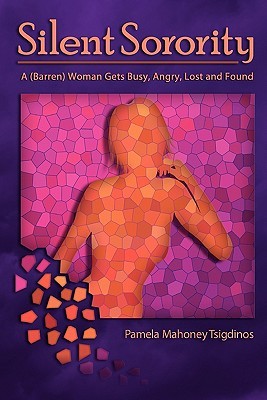 There are more violent stories about women in the Bible – the rapes of Tamar and Dinah, for instance, and Hagar and her child being cast out into the desert to die – but the barren woman’s story has an icy wind in it, a deep chill that lives in the hearts of the group of decent men from which it springs. It is because they are decent men that the story is ice cold. They bring her forward as their trump card against eternal life, and they give her to us as lasting evidence of how you can be civilized and cruel at the same time.
There are more violent stories about women in the Bible – the rapes of Tamar and Dinah, for instance, and Hagar and her child being cast out into the desert to die – but the barren woman’s story has an icy wind in it, a deep chill that lives in the hearts of the group of decent men from which it springs. It is because they are decent men that the story is ice cold. They bring her forward as their trump card against eternal life, and they give her to us as lasting evidence of how you can be civilized and cruel at the same time.
They want to debate Jesus on the preposterous notion of resurrection. They present the barren woman to him as a conundrum, arguing that eternal life would be an eternal mess, a social confusion of subjugation and subservience, things which in mortal life are sorted.
In their imaginations, the barren woman has been widowed seven times, and had been married to seven brothers. According to the law of the time, a decent man would marry his brother’s widow if there were no sons to support her. The barren woman had no children. In their story, all the world had seen her barrenness exposed seven times over.
The men want to know, in Jesus’ resurrection, whose servant will this worthless woman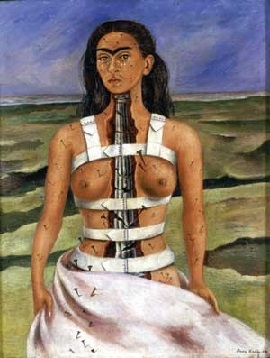 be? For them it is academic: if she had borne sons, then in an eternal world she would belong to the father of her sons. For in their thought women are born to serve men, as long as there is life. In this world and the next, they reason, fruitfulness and fecundity are part of faithfulness. And this barren woman is unimaginable in eternity. She is as shocking as (childless painter) Frida Kahlo’s self-portrait, The Broken Column.
be? For them it is academic: if she had borne sons, then in an eternal world she would belong to the father of her sons. For in their thought women are born to serve men, as long as there is life. In this world and the next, they reason, fruitfulness and fecundity are part of faithfulness. And this barren woman is unimaginable in eternity. She is as shocking as (childless painter) Frida Kahlo’s self-portrait, The Broken Column.
Worthless? Is the word unfair here? After all, she is in heaven, they imagine. But – no she is not – for they imagine her as the refutation of the possibility of heavenly experience. And the proof of their attitude is among us still: women parishioners, in their 80s and 90s, have shared 60 year old stories, with fresh tears, of being forbidden to go to college when their brothers were being sent because, their fathers declared, No man will want to marry you if you get so much education. One woman, whose mother had died when she was young, told this tale: her father agreed to college and even paid a deposit, but the men in his office argued him out of it, and instead he sent his unhappy daughter on a European tour, to keep her marriageable. Near the turn of the last century there had been articles by educated men, arguing that too much education would divert blood from a woman’s womb to her brain, rendering her barren.
Well, we no longer think this way . . . . and yet, the Christian church has so venerated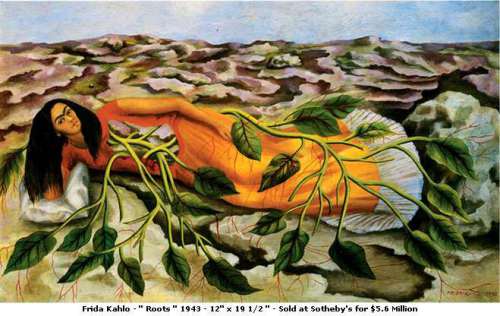 women as childbearers that it has been unable to imagine other roles for women, even though Jesus never praised childbearing or motherhood, and did imagine other roles for women: Mary has chosen the good portion and it will not be taken away from her, he said, when Mary chose to sit among the disciples and learn, rather than work in the kitchen. And perhaps most importantly, in this argument with the Sadducees over the barren woman, Jesus opened the gates of heaven to her, saying that in the resurrection, life is not as we know it here on earth, there is no owning or belonging to one another, for in eternity all are children of God. Thanks to Jesus, the barren woman does what is unthinkable: she steps into heaven on her own.
women as childbearers that it has been unable to imagine other roles for women, even though Jesus never praised childbearing or motherhood, and did imagine other roles for women: Mary has chosen the good portion and it will not be taken away from her, he said, when Mary chose to sit among the disciples and learn, rather than work in the kitchen. And perhaps most importantly, in this argument with the Sadducees over the barren woman, Jesus opened the gates of heaven to her, saying that in the resurrection, life is not as we know it here on earth, there is no owning or belonging to one another, for in eternity all are children of God. Thanks to Jesus, the barren woman does what is unthinkable: she steps into heaven on her own.
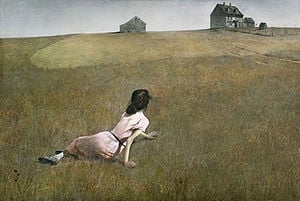 But entering church as a childless woman is harder, much harder. The culture is still so tilted toward fertility as fecundity, toward children as the fruit of the spiritual life, that other work, other interests, and other visions of church are treated as odd, if not as unwelcome. Catholic tradition has made an space for childless women as nuns, but insists on an absence of sexual identity, and an ‘otherness’ from childbearing women that is visual, cultural, and social.
But entering church as a childless woman is harder, much harder. The culture is still so tilted toward fertility as fecundity, toward children as the fruit of the spiritual life, that other work, other interests, and other visions of church are treated as odd, if not as unwelcome. Catholic tradition has made an space for childless women as nuns, but insists on an absence of sexual identity, and an ‘otherness’ from childbearing women that is visual, cultural, and social.
A recent NPR report detailed the data that show American women are increasingly choosing childlessness. Nearly 25 % of women are childless now, and the data skews higher among educated women, white women, younger women, who are saying, this is not the most important thing about me, and, there are other things I want to do with my life. An anomaly? Likely not, as for over twenty years now the census data has shown that, on the east coast, 73% of the population is no longer living in a nuclear family lifestyle. There is a stubborn resistance to this in large numbers of Christian churches, who claim Jesus as their standard of value. But Jesus made it clear, over and over again, that he embraces barren women, promiscuous women, fallen women, prostitutes – women who suffer social stigma still, and women who are not defined by belonging to a husband. And unlike earlier prophets, there is no story of Jesus inducing fertility in a barren woman.
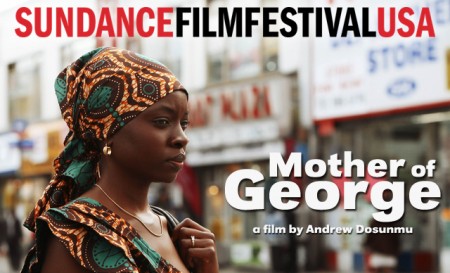 The new Nigerian –American film, Mother of George, tells a story of infertility set in Brooklyn, among immigrant Nigerians. As the infertile woman suffers more and more rejection by her husband and mother-in-law (who has already named the son she has not borne George), she is moved to a desperate decision. And she reminds us that the meaning of fertility, the meaning of family, and the meaning of fecundity, alter with time, culture, possibility, and suffering.
The new Nigerian –American film, Mother of George, tells a story of infertility set in Brooklyn, among immigrant Nigerians. As the infertile woman suffers more and more rejection by her husband and mother-in-law (who has already named the son she has not borne George), she is moved to a desperate decision. And she reminds us that the meaning of fertility, the meaning of family, and the meaning of fecundity, alter with time, culture, possibility, and suffering.
We need a new imagination: for human intimacy, its purpose and our need for it; for fecundity, which brings forth from us, in Christian wisdom, kindness, acceptance, community; for work, which raises us up not only in generations but in ideas, art, works of peace; and for life itself, which by God’s design is endlessly evolving. We have, as a permanent legacy, John the Baptist’s warning: God does not need us to raise up children for God. Essential for understanding eternal life is understanding this, according to Jesus. And we have Jesus’ own words, when he got the message that his mother and brothers were at the door and wanted to take him home: All who hear my words and do them are my family.
_______________________________________________________
Illustrations:
1. Silent Sorority, Book Cover. Google Images.
2. The Broken Column, by Frida Kahlo. Image from Wikipedia page for The Broken Column
3. Roots, by Frida Kahlo. 1943. Image: Famous Mexican Artists website and blog.
4. Christina’s World, by Andrew Wyeth. 1948. Image from Wikipedia page for Christina’s World.
5. Mother of George Poster. Google Images











